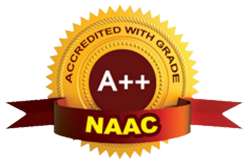The School of Sciences started functioning in 1986, with the challenge of imparting good quality theoretical and practical education in four science disciplines, namely, Physics, Chemistry, Mathematics and Life Sciences. With time, the School evolved and added new disciplines namely, Biochemistry, Geography, Geology and Statistics. Faculty members are involved in planning, developing and offering academic programmes at the Awareness, Certificate, Diploma, Under-Graduate, Post Graduate levels in the distance mode, and Research in the regular mode. So far, the School has designed, developed and offered 29 programmes.
In December, 1991, the School launched the Bachelor of Science Programme-one of its kind in the country involving teaching of theory and laboratory courses in science through distance and open learning mode. The programme was initially designed to offer a B.Sc. (General) degree, but was subsequently upgraded so as to offer a B.Sc. (Major) degree in Botany, Chemistry, Mathematics, Physics and Zoology. In 2019, in accordance with University policy to adopt CBCS system advocated by the UGC, the School of Sciences reformulated these undergraduate degree programmes to B.Sc. General (BSCG) with 7 disciplines namely Botany, Chemistry, Geology, Geography, Mathematics, Physics and Zoology. Another undergraduate progeamme, B.Sc. (Honrs) Biochemistry was launched in 2020.
The Master’s programme in Mathematics with Applications in Computer Science [M.Sc. (MACS)] was launched in the year 2008. The School offers several niche programmes for professional and skill development such as the PG Diploma in Analytical Chemistry (PGDAC), Post Graduate Diploma in Applies Statistics (PGDAST), Post Graduate Certificate in Geoinformatics (PGCGI), Diploma in Aquaculture (DAQ), Certificate Programme in Teaching of Primary School Mathematics (CTPM), Certificate Programme in Laboratory Techniques (CPLT) as well as a general awareness programme and a course, namely, the PG Diploma in Environment and Sustainable Development (PGDESD) and Appreciation Course on Environment (ACE).
Doctoral programmes are also offered in the Disciplines of Biochemistry, Chemistry, Geology, Geography, Life Sciences, Mathematics and Physics and Statistics.
The School has also collaborated with the School of Social Sciences and School of Education in launching the Certificate Programme in Environmental Studies (CES) and the Post Graduate Certificate in Professional Development of Teachers (PGCPDT), respectively. Some of the courses prepared by the School also form part of PGDIPR, BPP, BA, B.Com, BCA, BIT, B.Sc. (Nursing), BTS, BCOMG, BAG and MCA programmes.
Laboratories in Physics, Chemistry, Life Sciences, Geology and Geography have been established in the School for curriculum development and research in respective Disciplines as well as by Biochemistry Discipline. In spite of University’s focus on systemic research in the early years and infrastructure related constraints, the Faculty members in different disciplines are carrying out excellent research which is being funded by many Government agencies such as DST, UGC, CSIR, DBT, BRNS, etc. The research papers have been published in peer reviewed high impact journals of national and international repute. The School has also a well maintained Geological Museum that has a display of rocks, minerals and fossils from type areas and other geologically important horizons in India collected by its faculty members and research scholars.
Apart from the course development the School has fulfilled its social, training and extension responsibilities towards popularization of science and promotion of scientific temper through a host of activities such as organizing popular lectures on contemporary science related themes, conducting Seminars/Workshops/Conferences/panel discussions/webinars, celebration of National Days of importance in science such as National Science Day, National Environment Day, World Environment Day, International Day for Disaster Risk Reduction, National Mathematics Day. A special training programme, namely, the Post Graduate Certificate in Professional Development of Teachers for senior secondary science teachers of Navodaya Vidyalayas across the country was developed and offered by the School in collaboration with the School of Education, IGNOU. Under the aegis of UNESCO, several training programmes were conducted for University teachers from national and international institutions.
The functions of the School are to:
a) plan, develop and offer academic programmes at the certificate, diploma, undergraduate, post-graduate, doctoral and awareness levels.
b) encourage research in discipline-based as well as systemic areas.
c) collaborate in the development of programmes/courses offered by other Schools of the University.
d) print course materials developed in the School.
e) provide learner support using electronic media and ICT tools.
f) participate in the development and monitoring of student support services.
g) provide consultancy to organisations and training to individuals, sponsored by national and international agencies.
h) organise and participate in workshops, conferences and seminars sponsored by National and International agencies with a view to improve transaction of science curriculum.
Development of Self-Instructional Study Material
The School has developed more than 200 courses so far, of which 16 Courses are on offer in M.Sc. (MACS), 63 courses in the B.Sc. programme (B.Sc.) in both English and Hindi medium, B.Sc. General (BSCG) 144 in both English and Hindi medium, 76 courses in B.Sc. Honors (Bio-Chemistry), 8 Courses in PGDESD, 8 courses in PGDAC, 9 courses in PGDAST, 4 courses in PGCGI, 6 courses in DAQ, 4 courses in CPLT, 2 courses in CTPM and 1 course in Appreciation Course on Environment. The experimental component of M.Sc. (MACS), BSC, BSCG, PGDAC, DAQ and CPLT programmes is provided through innovatively designed laboratory courses.



